-
 Bitcoin
Bitcoin $84,896.8354
0.49% -
 Ethereum
Ethereum $1,602.4356
0.92% -
 Tether USDt
Tether USDt $0.9999
0.02% -
 XRP
XRP $2.0718
0.32% -
 BNB
BNB $588.8930
-1.12% -
 Solana
Solana $138.0987
3.60% -
 USDC
USDC $1.0000
0.02% -
 Dogecoin
Dogecoin $0.1569
-0.04% -
 TRON
TRON $0.2412
-0.39% -
 Cardano
Cardano $0.6209
-0.06% -
 UNUS SED LEO
UNUS SED LEO $9.3114
3.07% -
 Chainlink
Chainlink $12.7499
1.47% -
 Avalanche
Avalanche $19.6967
4.01% -
 Stellar
Stellar $0.2447
1.35% -
 Toncoin
Toncoin $2.9511
-1.71% -
 Shiba Inu
Shiba Inu $0.0...01215
-0.19% -
 Hedera
Hedera $0.1650
0.21% -
 Sui
Sui $2.1303
0.65% -
 Bitcoin Cash
Bitcoin Cash $333.7715
-2.36% -
 Hyperliquid
Hyperliquid $17.8349
7.67% -
 Polkadot
Polkadot $3.7320
0.93% -
 Litecoin
Litecoin $75.2308
-1.48% -
 Bitget Token
Bitget Token $4.5072
2.35% -
 Dai
Dai $0.9999
-0.02% -
 Ethena USDe
Ethena USDe $0.9991
-0.01% -
 Pi
Pi $0.6467
4.30% -
 Monero
Monero $212.9652
-2.31% -
 Uniswap
Uniswap $5.2435
1.28% -
 Pepe
Pepe $0.0...07338
1.43% -
 OKB
OKB $50.5063
0.07%
What is tokenization? How does blockchain achieve asset tokenization?
Blockchain facilitates tokenization, converting real-world assets into digital tokens, offering increased liquidity, fractional ownership, and improved efficiency via secure, transparent, and decentralized technology.
Mar 11, 2025 at 10:55 am
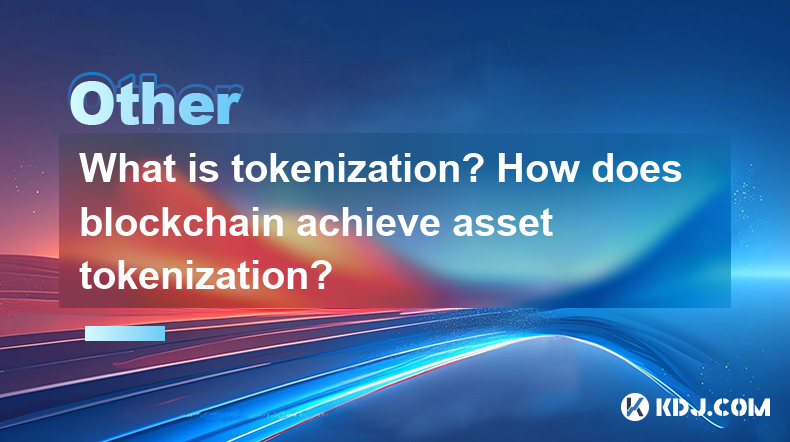
Key Points:
- Tokenization is the process of representing real-world assets as digital tokens on a blockchain.
- Blockchain technology facilitates tokenization through its decentralized, secure, and transparent nature.
- Several methods exist for achieving asset tokenization on a blockchain, each with its own advantages and disadvantages.
- Security and regulatory compliance are crucial considerations in tokenization projects.
- Tokenization offers numerous benefits, including increased liquidity, fractional ownership, and improved efficiency.
What is Tokenization?
Tokenization is the process of converting real-world assets – like real estate, art, commodities, or even intellectual property – into digital tokens on a blockchain network. These tokens represent ownership or a share of ownership in the underlying asset. Each token is unique and verifiable, providing a transparent and auditable record of ownership. This digital representation allows for easier trading, fractional ownership, and increased liquidity compared to traditional methods. Think of it as digitizing a certificate of ownership.
How Does Blockchain Achieve Asset Tokenization?
Blockchain technology is perfectly suited for tokenization due to its inherent characteristics. Its decentralized nature eliminates the need for intermediaries, reducing costs and increasing transparency. The immutable ledger ensures the security and integrity of the tokenized asset's record. Smart contracts, self-executing agreements built into the blockchain, automate processes like transfers and dividends, streamlining operations.
Methods of Asset Tokenization on a Blockchain:
Several methods exist for tokenizing assets on a blockchain, each with its own strengths and weaknesses:
- Security Tokens: These tokens represent ownership in a regulated security, such as company shares or bonds. They are often subject to strict regulatory requirements.
- Utility Tokens: These tokens grant access to a product or service offered by a company. They don't represent ownership in the company itself.
- Non-Fungible Tokens (NFTs): NFTs represent unique, non-interchangeable assets, such as digital art or collectibles. Each NFT is distinct and has a verifiable ownership history.
- Fractionalization: This method allows for the division of a single asset into multiple smaller tokens, enabling fractional ownership and increased liquidity.
The Role of Smart Contracts in Tokenization:
Smart contracts are crucial to the tokenization process. They automate various aspects of managing the tokenized asset, such as:
- Automated Transfer of Ownership: When a token is transferred, the smart contract automatically updates the ownership record on the blockchain.
- Dividend Distribution: Smart contracts can automate the distribution of dividends or profits to token holders.
- Compliance Enforcement: Smart contracts can be programmed to enforce regulatory compliance requirements.
Security and Regulatory Compliance in Tokenization:
Security is paramount in tokenization. Blockchain's inherent security features help mitigate risks, but robust security practices are still necessary. This includes secure key management, regular audits, and adherence to best practices. Regulatory compliance is another crucial aspect. The legal framework surrounding tokenization is still evolving, and projects must navigate various regulations depending on the jurisdiction and type of asset being tokenized.
Benefits of Asset Tokenization:
Tokenization offers a range of benefits for both issuers and investors:
- Increased Liquidity: Tokenization can significantly increase the liquidity of traditionally illiquid assets, making them easier to buy and sell.
- Fractional Ownership: Assets can be divided into smaller fractions, making them accessible to a wider range of investors.
- Transparency and Efficiency: The blockchain's transparency and automation features streamline processes and reduce costs.
- Reduced Counterparty Risk: The decentralized nature of blockchain reduces reliance on intermediaries, mitigating counterparty risk.
Different Blockchain Platforms for Tokenization:
Various blockchain platforms are suitable for tokenization, each with its own characteristics:
- Ethereum: A widely used platform with a mature ecosystem and extensive smart contract capabilities.
- Hyperledger Fabric: A permissioned blockchain platform often used for enterprise-level tokenization projects.
- EOS: A high-throughput blockchain platform designed for scalability.
The Future of Asset Tokenization:
Tokenization is poised for significant growth in the coming years, with potential applications across various industries. As the regulatory landscape clarifies and technology continues to evolve, we can expect to see even wider adoption of tokenization.
Frequently Asked Questions:
Q: What are the risks associated with tokenization?
A: Risks include smart contract vulnerabilities, regulatory uncertainty, and market volatility. Thorough due diligence and risk management are essential.
Q: How is the value of a token determined?
A: The value of a token is typically linked to the value of the underlying asset. However, market forces and speculation can also influence its price.
Q: Is tokenization suitable for all types of assets?
A: While many asset types can be tokenized, some may be more suitable than others depending on their characteristics and the regulatory environment.
Q: What are the regulatory implications of tokenization?
A: The regulatory landscape is evolving, and regulations vary depending on the jurisdiction and the type of token and underlying asset. Compliance is crucial.
Q: How secure is blockchain technology for tokenization?
A: Blockchain technology offers high levels of security due to its decentralized and cryptographic nature. However, smart contract vulnerabilities and other security risks need to be addressed.
Disclaimer:info@kdj.com
The information provided is not trading advice. kdj.com does not assume any responsibility for any investments made based on the information provided in this article. Cryptocurrencies are highly volatile and it is highly recommended that you invest with caution after thorough research!
If you believe that the content used on this website infringes your copyright, please contact us immediately (info@kdj.com) and we will delete it promptly.
- Aave [AAVE] registers a 1.11% uptick, trailing slightly behind its 2.91% gain for the week.
- 2025-04-20 00:35:12
- As Investor Confidence Begins to Return in 2025, the Hunt for Undervalued Altcoins Has Intensified
- 2025-04-20 00:35:12
- The next challenge in crypto: Liquidity fragmentation
- 2025-04-20 00:30:14
- Just Released: Global Cash & Coin Deposit Bags Market Study by HTF MI
- 2025-04-20 00:30:14
- Meme coin dogwifhat (WIF) is back in the spotlight as crypto markets begin to show signs of life.
- 2025-04-20 00:30:13
- The Chill That Pays the Bills: Why Arctic P.A.C.O. at $0.000095 Might Be the Coolest Buy of 2025, While Floki and Gohome Stay Strong
- 2025-04-20 00:30:13
Related knowledge
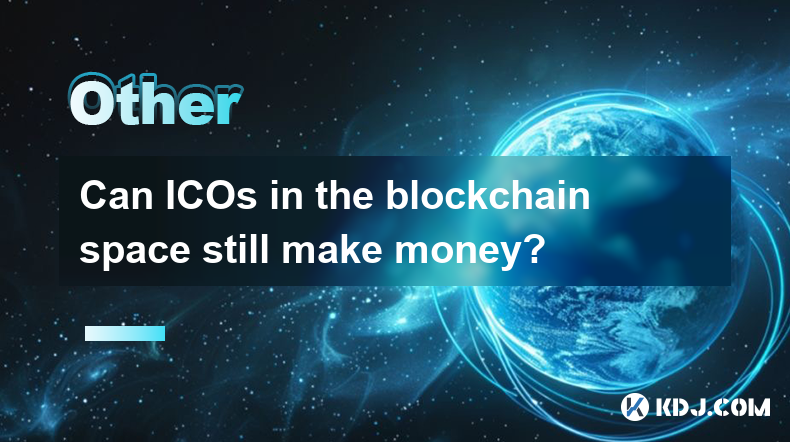
Can ICOs in the blockchain space still make money?
Apr 17,2025 at 08:29pm
The landscape of Initial Coin Offerings (ICOs) in the blockchain space has evolved significantly since their peak in 2017 and 2018. Despite the increased regulatory scrutiny and the rise of alternative fundraising methods like Security Token Offerings (STOs) and Initial Exchange Offerings (IEOs), ICOs can still be a viable way to raise funds and generat...
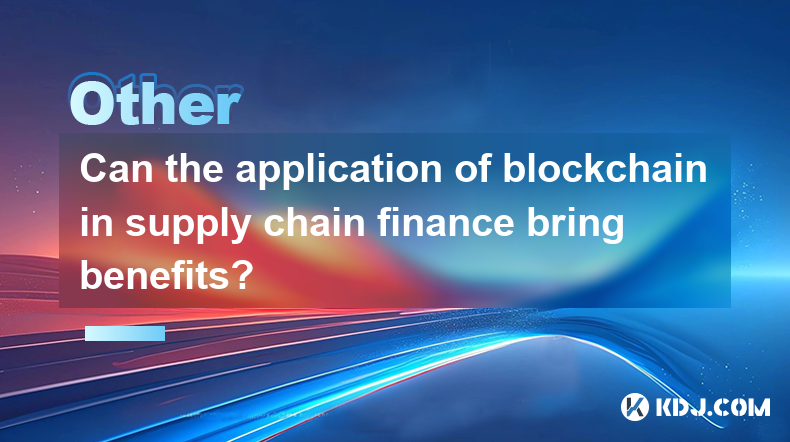
Can the application of blockchain in supply chain finance bring benefits?
Apr 15,2025 at 04:00pm
Can the application of blockchain in supply chain finance bring benefits? The integration of blockchain technology into supply chain finance has garnered significant attention in the cryptocurrency and financial sectors. This article explores how blockchain can potentially revolutionize supply chain finance, detailing its benefits and providing a compre...

Does the ranking of Chinese blockchain apps include cross-chain applications?
Apr 14,2025 at 04:00pm
The ranking of Chinese blockchain apps is a comprehensive evaluation that takes into account various aspects such as user base, transaction volume, and technological innovation. A pertinent question arises regarding whether these rankings include cross-chain applications. Cross-chain applications, which allow different blockchain networks to interact an...
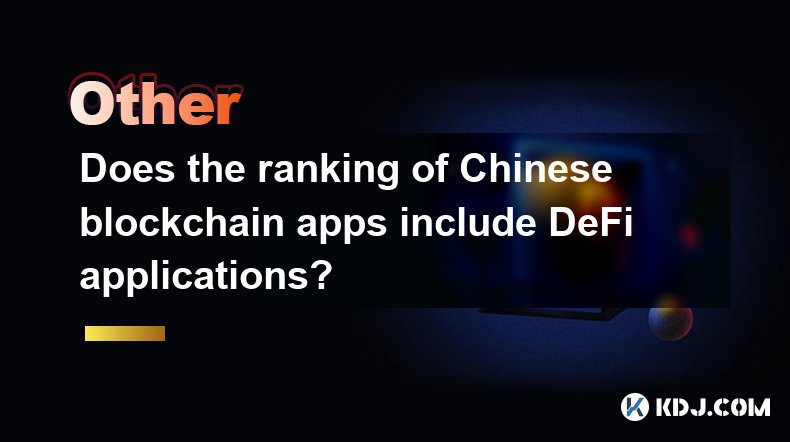
Does the ranking of Chinese blockchain apps include DeFi applications?
Apr 15,2025 at 06:57am
The ranking of Chinese blockchain apps is a comprehensive list that showcases the most popular and influential applications within the cryptocurrency ecosystem. One question that often arises is whether these rankings include DeFi applications. To answer this, we need to delve into the specifics of how these rankings are compiled and what types of appli...
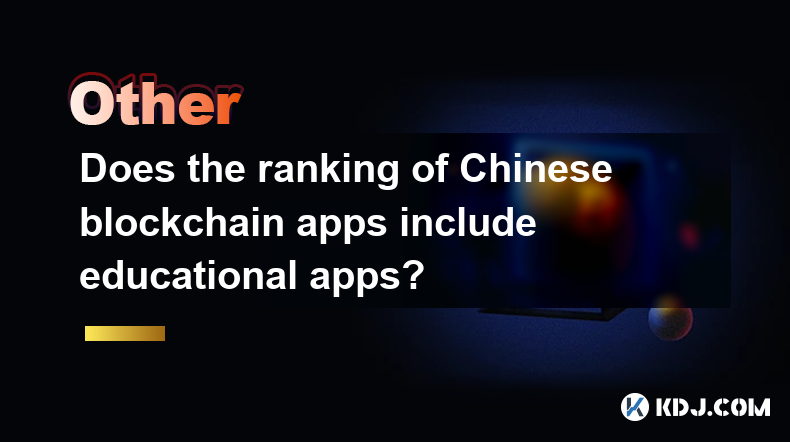
Does the ranking of Chinese blockchain apps include educational apps?
Apr 16,2025 at 03:35am
The ranking of Chinese blockchain apps often includes a variety of categories, from finance and gaming to social networking and beyond. One question that frequently arises is whether these rankings include educational apps. To address this, we need to delve into the specifics of how blockchain apps are categorized and ranked in China, and whether educat...
Does the ranking of Chinese blockchain apps include enterprise-level applications?
Apr 15,2025 at 06:42am
The ranking of Chinese blockchain apps often includes a variety of applications, ranging from consumer-focused to enterprise-level solutions. Understanding the scope and criteria for these rankings is essential to determine if enterprise-level applications are included. This article delves into the specifics of how Chinese blockchain app rankings are co...

Can ICOs in the blockchain space still make money?
Apr 17,2025 at 08:29pm
The landscape of Initial Coin Offerings (ICOs) in the blockchain space has evolved significantly since their peak in 2017 and 2018. Despite the increased regulatory scrutiny and the rise of alternative fundraising methods like Security Token Offerings (STOs) and Initial Exchange Offerings (IEOs), ICOs can still be a viable way to raise funds and generat...

Can the application of blockchain in supply chain finance bring benefits?
Apr 15,2025 at 04:00pm
Can the application of blockchain in supply chain finance bring benefits? The integration of blockchain technology into supply chain finance has garnered significant attention in the cryptocurrency and financial sectors. This article explores how blockchain can potentially revolutionize supply chain finance, detailing its benefits and providing a compre...

Does the ranking of Chinese blockchain apps include cross-chain applications?
Apr 14,2025 at 04:00pm
The ranking of Chinese blockchain apps is a comprehensive evaluation that takes into account various aspects such as user base, transaction volume, and technological innovation. A pertinent question arises regarding whether these rankings include cross-chain applications. Cross-chain applications, which allow different blockchain networks to interact an...

Does the ranking of Chinese blockchain apps include DeFi applications?
Apr 15,2025 at 06:57am
The ranking of Chinese blockchain apps is a comprehensive list that showcases the most popular and influential applications within the cryptocurrency ecosystem. One question that often arises is whether these rankings include DeFi applications. To answer this, we need to delve into the specifics of how these rankings are compiled and what types of appli...

Does the ranking of Chinese blockchain apps include educational apps?
Apr 16,2025 at 03:35am
The ranking of Chinese blockchain apps often includes a variety of categories, from finance and gaming to social networking and beyond. One question that frequently arises is whether these rankings include educational apps. To address this, we need to delve into the specifics of how blockchain apps are categorized and ranked in China, and whether educat...

Does the ranking of Chinese blockchain apps include enterprise-level applications?
Apr 15,2025 at 06:42am
The ranking of Chinese blockchain apps often includes a variety of applications, ranging from consumer-focused to enterprise-level solutions. Understanding the scope and criteria for these rankings is essential to determine if enterprise-level applications are included. This article delves into the specifics of how Chinese blockchain app rankings are co...
See all articles























































































